| (I was away for a week at the end of May, which is why the next few entries of the India journal are a bit Hong Kong-centric. But sometimes it's good to go away and look at the country from a different perspective...)
Tuesday, May 30 I loved this sign in Macau for how neatly it juxtaposes the meandering nature of romance languages with the terseness of English. I imagine the Portuguese, Italians, Spanish and so on must find it quite off-putting to be told in an English-speaking country "Don't spit", for example, when they might say something more along the lines of "Please kindly refrain from expelling moisture-laden particles from your facial orifice." Except of course it would sound much prettier. (you can click on it to see some of the other things you're not suppposed to do in Macau) 
Speaking of languages, on a whim I picked up "Learn Nepali Through English in a Month" while doing gift-shopping on Janpath. I was talking with J., who is still in Kathmandu, and I was saying how it feels kind of presumptuous to always talk to Nepalis in Hindi and assume they understand. J. is learning French, which doesn't seem extremely useful in Nepal, but you never know. The book doesn't say how much time you have to dedicate to it to learn the language in a month and I'm also worried that trying to speak both Hindi and Nepali might be like trying to speak both Spanish and Portuguese -- you'll still end up speaking Hindi to people, you'll just think you're speaking in Nepali. Also my Hindi is not that good to begin with though I think it's improved. I now know a very useful phrase: antarashtriya samachar samiti (international news agency). I haven't
actually got very far with the book yet, mainly because I was so entranced
by the publisher's note that I just stopped there and started to think
about the person who might have composed it. I feel compelled to transcribe
a few lines here: "The Nepali and Hindi speaking students can easily make a breakthrough and pick up the flowers in the garden of Nepali language with the minimum effort and within the shortest possible time ... Readers will enjoy the Nepali language a great deal." Sunday, May 28 I am a giant among women in Hong Kong, one wearing man clothes apparently. All the women there are dressed so much more girlie than you see anyone dressed in (not fair to use Delhi as a comparison) but say, New York. They wear flouncy knee-length skirts, embellished with frills and ruffles, often in pink. And pointy-toed shoes with little heels and often a bow at the front. What else is there to say about Hong Kong? Did I mention they have a lot of tall buildings? Shiny, too.
There is also some Hong Kong-Colombia connection that I must do some research into -- I hope it is not a "Maria Full of Grace" thing. The first and last non-airport people I spoke to there were Colombian women. The latter two were eating mangustans, which some of you may remember from my trip to the South. (yet another thing, like Lux and Bata that is not only Indian. So confusing, what is and what is not). They said they were going to China to buy cheap clothes to sell in Colombia. The mangustan-eating Colombians had been all over Asia and one of them said her favorite place ever is Singapore, for being so clean, so well-organized and all the things one usually hears about Singapore and that Hong Kong is not half so organized. I didn't say anything, but I thought she ought to visit Delhi. I reported this conversation back to my sister who asked a very good question: What is the Singapore of Singapore? In India, people look to Hong Kong and Shanghai, in Shanghai they look to Singapore, so who do the Singaporeans look to? Back at the Delhi airport Saturday night, the immigration men were yelling rudely at the stunned arrivals from Osaka. That reminds me, the flight originating from Japan was bang on time, unlike that ill-fated flight originating in Bombay. On the flight from India, the air hostesses glared at us for asking for more than one serving of alcohol, on the flight from Japan, the air hostesses asked "Two. Three?" when anyone ordered beer or wine. My prepaid taxi driver tried to take another guy along with us when leaving the airport so he could "learn." The second guy was a spindly little fellow but I insisted we leave him behind. The driver turned out to be very nice, allowing me to smoke in the car even though it was fueled by compressed natural gas and I could have blown the both of us up. I had no lighter so he rummaged in the back pocket of his seat, throwing wrenches, spanners and so on into the street in his search, but no luck. Then he stopped at a stall to get me matches and tried to save me a rupee by insisting I light the cigarette then and there and return the matches. I played the big spender instead, shelling out 10 rupees for a lighter. But then the car broke down when refueling. The guy called up a friend of his to take me home, who showed up with a friend of his. So in spite of this system that is meant to make foreign tourists (especially the women) feel more secure by recording the number of the car they have set off in and paying the solo driver only when he gets the ticket stub from the customer and goes back to the airport, I found myself being driven home by one burly man and two spindly ones in a completely different car than the one I had set off from the airport in. The spent the remaining 25 minutes of the ride having a round-robin conversation along the lines of "Was it the fan belt? It was probably the fan belt. What do you think it was?, etc." And where a year ago I would have been wondering if they were going to drive down a side road, murder me and abscond with my prepaid ticket, I found their conversation soothing background patter and looked out the window while they talked. There was a lovely breeze blowing and the city seemed so unassuming and humble after bright and shiny Hong Kong, it made me feel very warmly towards down-at-the-heels Delhi. And to my three drivers. Sunday, May 21 I was just reflecting this evening, when a pre-monsoon shower drenched the city and through the windows you could smell that wet earth and water smell that I never associate with rain anywhere else in the world, that perhaps I could really come to love this city again. Not just for when it reminds me of the city it was when I was a child, but for the striving, pushy, fighting city it is now. Or maybe always. Then I went to the airport Saturday night to catch a flight for Hong Kong. At 10.30, the scheduled boarding time, I was ushered away from the security check with a terse "your flight has not been called." Attempts to collar official-looking people wearing lanyards and name tags to find out what happened were fruitless. After some time it turned out that even though it was now eleven, the flight, which originates in Bombay, had not departed from there yet. One man offered a possible departure time of 1.30 but he didn't seem to have much faith in what he was offering himself. I snuck away to the business class lounge and ate free chicken sandwiches and coffee till two, when we were told the flight had been cancelled due to a "technical snag." I was told to go look at a board downstairs but that board only had the details of some other delayed flight. Eventually, by following the trail of other disgruntled looking people (though not always a helpful tactic, since most people at Indian airports are invariably disgruntled) I did the reverse passage through customs and immigration, took a taxi home and arrived here at three a.m. The flight may leave Sunday at five, but again, the Air India people don't seem particularly confident. Got to love that Indian efficiency, sometimes I just can't believe Kafka wasn't one of us.
Unrelatedly, let it never be said that India doesn't care about the disabled. Here, on the right, is a sign I saw at the Delhi zoo the other day. And even though you want to not like anything about the zoo, because it's so dry and parched and the natural habitats all have a thick veneer of dust, still I must say, hippos are lovely.
Thursday, May 18
Wednesday, May 17
I went for a walk in Lodi Gardens on Monday in an attempt to get back in to some form of exercise routine. What with my propensity to trip and fall over potholes, or sometimes nothing (I have weak ankles! Really!) it seemed too dangerous an endeavor for a long time but I think if I step carefully it should work out all right. As usual all the courting couples were there, rustling away in the bushes. It would be better for them if their lady loves didn't wear such bright clothes -- a yellow salwar kameez tends to rather stand out of dark green foliage. I tried to avert my eyes from one particularly amorous couple but in a show of nonchalance -- perhaps to show the world they were doing nothing wrong -- the male of the two called out very loudly to ask me what time it was. Did one of them have to go back to a legal significant other? Or perhaps they were each other's legal significant others and it being almost five, it was time for the yellow-clad lady to go home and make tea for the in-laws. A little further along I saw a sign for the "National Bonsai Garden," which sounded nice. I went to have a look but the gate was padlocked. I could peer over it though, and saw some very small and undergrown shrubs and plants. I don't think it is very accurate to call plants that are stunted from lack of water and care "bonsai." I'm sure the Japanese would agree. So, now that the protests against demolitions and shop sealings are slowing because of a law to put those drives on hold for a year, a new set of protests are underway. Medical students are protesting plans to increased the affirmative action quotas for "other backward castes" in medical universities. The quotas are at above 20 percent now, and if the plan goes through, they will be at 50 percent. The medical students are protesting more than the engineering and other graduate students because there are fewer medical seats. But some of the protests struck a funny note with me. Of course there are the "relay" hunger strikes, where people don't eat for a few hours, and then another set of people don't eat for a few hours, for instance, between lunch and dinner. But in some places people have been polishing shoes, washing car windows, pulling rickshaws and sweeping the streets to say "this is what we'll be reduced to" if you increase affirmative action. But, those are all jobs that someone does in this society and in any society. And probably they are all jobs that no one wants to do if they have another choice. So on the one hand the students are arguing that if there is more affirmative action, they will lose the choice to not be street sweepers or cleaners or shoe polishers. But can't the other side make the mirror argument -- that if there isn't more affirmative action they won't have the choice not to be shoe polishers, rickshaw pullers, et al.? As a form of protest, I rather think belittling the labor that many do and many are forced to do for lack of better options is an odd way of winning sympathy. I wonder what the street sweepers and shoe polishers think about it. I don't think it will actually come to this but one thing that worries me a little is when graduate quotas were first instituted in the 1990s there were very violent protests where some students set themselves on fire. There are very powerful images of at least one boy who did. I generally carry a bottle of water around with me but since kerosene is the fuel used, I believe you are not supposed to use water to put out oil fires, since water and oil don't mix. The only way of putting out a fire like that is to roll the burning person up tightly in a carpet, but Idon't see that I can very well go around reporting with a rolled up carpet with me. A flame-retardant blanket might be more handy to throw on someone if I were to be at such a protest. Though all the photographers would not doubt hate me.
Friday, May 12
Saturday, May 6 I went to work in the afternoon on April 24 expecting to be there till about 10.30. Instead, at 10.30 that night I found myself in the Hyatt in Kathmandu waiting for their monarch to make a speech. I was really glad to be back there to see what had happened since January when I was last there. And I wanted to see the crowds that hadn't materialized in February. As luck would have it, as soon as I got there everything became calm and peaceful, so I was not witness to the massive democracy protests, nor brick-throwing nor shooting nor tyre-burning. The king made a speech that night restoring parliament which hadn't been around for four years and everything was comparatively hunky dory from then on. What was strange is how quickly everything melted back into normalcy, except for the broken walls whose bricks had been used as barricades. I saw
a residue of what had come before at a democracy rally after the king's
speech, a sort of victory celebration. The new prime minister -- an
84-year-old -- hadn't been well enough to attend, and a swarm of young
men got angry and tried to take the stage. It was a sort of bonsai
stampede, mitigated by the fact that these guys were all on the same
side and hadn't come particularly prepared. So instead of rocks or
bricks they threw pebbles at the stage, instead of sticks, they had
twigs. It was a funny mood -- elation tempered with anger. But it
was nothing compared to what the other journalists who had been there
since April 6 spoke of. Here are two photographers' perspectives on the protests: http://digitaljournalist.org/issue0605/blood-spilled-in-kathmandu.html http://www.pdnonline.com/pdn/spotlight/article_display.jsp?vnu_content_id=1002462030 But the result is now that I'm back here in Delhi I feel so restless. I feel unable to talk to anyone here and kind of logged out of here. I want to be back in Nepal watching everything -- or maybe nothing -- change, or maybe some other place like that. It's weird, considering I wasn't really there for the main action but now I feel all charged up, like I don't want to go back to normal everyday life -- the one of laundry and regular meals and conversations about the weather -- but live in that suspended animation where life revolves around reporting, drinking and hotels. Funny, if I'm feeling like this, those guys must be a hundred times worse!Being there did remind me again of one of the reasons I moved to Delhi, which is something I sometimes lose track of when I give lots of different answers to lots of people. The answers range from 'I haven't lived here for a long time' (a fact, rather than an explanation) to 'nostalgia' (more truthful though not fact, since by the time I moved here it was a long time since I had actually missed India) to 'My parents retired and I'm looking after them' (total untruth but makes me seem a better person than I am). A strong part of it though, was that sometimes, walking around New York City, looking at the crowds, the buildings, the billboards, I had this sense of being in a place where nothing would change, where everything had been built and put in place before I got anywhere near it. And tha was both stifling and scary. Here in Delhi, I have this feeling often that everything -- EVERYTHING -- is changing even when I can't really see it or figure out how it is changing. Sometimes you see it, like when you drive on the bridge to Delhi and see trucks, people and police parked on the other side and you know that a whole neighborhood is being uprooted and banished from the city. And you know it when the woman who cooks lunch and and dinner for you turns out to be an informal bank manager in her own neighborhood, in her own life. And even if in the middle of all the flux and change you do realize that some of the possible futures are prewritten, it still feels like the space for what is possible is much larger than it is elsewhere. Nepal has that in spades right now. G. once said after September 11 it felt like all the rules of normal life were suspended and then once they seemed to be reinstated again, it was so hard to adjust. I know I'll feel normal in a day or two but I sort of don't want to. I sort of don't want to go back to everyday life but live one where everything is up in the air. Does that make any sense? |
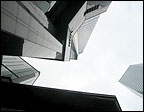
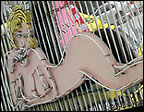
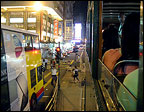
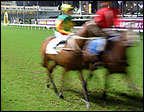
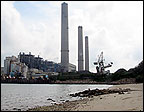
 I
wonder if Hong Kong is the city New Delhi planners invoke when they
say they want the city to be "world-class." It's true they have a
public transport system anyone could fall in love with. You can leave
a building without checking a map and just by following street signs
get to the road, bus, metro or tram you want. But somehow, in spite
of longing to be in a "real" city after months here, I found myself
missing the challenge that is Delhi. Everything was too easy. There
was no getting lost, nothing to fight about with people on the street
about, no potholes to fall into (yet I sprained my ankle there). Is
a city really a city if it is not a seething vat of hostility and
anger?
I
wonder if Hong Kong is the city New Delhi planners invoke when they
say they want the city to be "world-class." It's true they have a
public transport system anyone could fall in love with. You can leave
a building without checking a map and just by following street signs
get to the road, bus, metro or tram you want. But somehow, in spite
of longing to be in a "real" city after months here, I found myself
missing the challenge that is Delhi. Everything was too easy. There
was no getting lost, nothing to fight about with people on the street
about, no potholes to fall into (yet I sprained my ankle there). Is
a city really a city if it is not a seething vat of hostility and
anger? Still
all in all, it's been a pretty fun half a weekend. Driving around
with friends on Friday evening, one of them commented on how much
driving around Delhi was like being in the United States, but perhaps
the booming America of the 1950s. It was interesting to hear someone
else say it, because often I think there's been an Americanification
of the city -- what with commuting and dating and migration debates.
But it's also funny to think, given the mixed feelings I've often
had towards the United States, that not only am I tussling with my
feelings towards the America of now, but with a past America through
its Indian incarnation.
Still
all in all, it's been a pretty fun half a weekend. Driving around
with friends on Friday evening, one of them commented on how much
driving around Delhi was like being in the United States, but perhaps
the booming America of the 1950s. It was interesting to hear someone
else say it, because often I think there's been an Americanification
of the city -- what with commuting and dating and migration debates.
But it's also funny to think, given the mixed feelings I've often
had towards the United States, that not only am I tussling with my
feelings towards the America of now, but with a past America through
its Indian incarnation.
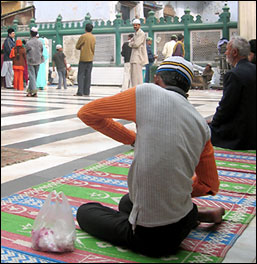
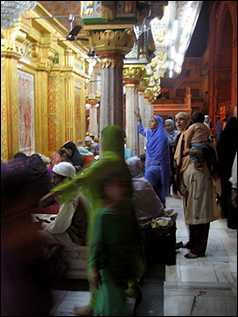 In
a city, any city, you can never be insider enough. With my short acquaintance
of the city, I at least can be very clear I'm an an outsider, but
it's interesting to hear other residents demarcate the line between
outsiders and insiders. There's a place, an open secret, a Sufi shrine
in Nizamuddin where on Thursday evenings Sufis sing. It's been written
about everywhere from William Dalrymple's "City of Djinns" to those
Eye-Witness guides. So it's no secret but the first time anyone goes,
even a longtime inhabitant of the city, it's always a revelation.
Something you never really knew was there even though it's been there
for hundreds of years. Yet the other day I heard friends talking about
how they much prefer to listen to qawwalis in a basement of the house
of some family some steps from the shrine, which they say has become
too commercialized, too touristy. Constantly seeking the undiscovered,the
hidden, seems sort of a losing game because if it's truly remarkable
you want to tell someone about it, and then it quickly becomes everyone's.
In
a city, any city, you can never be insider enough. With my short acquaintance
of the city, I at least can be very clear I'm an an outsider, but
it's interesting to hear other residents demarcate the line between
outsiders and insiders. There's a place, an open secret, a Sufi shrine
in Nizamuddin where on Thursday evenings Sufis sing. It's been written
about everywhere from William Dalrymple's "City of Djinns" to those
Eye-Witness guides. So it's no secret but the first time anyone goes,
even a longtime inhabitant of the city, it's always a revelation.
Something you never really knew was there even though it's been there
for hundreds of years. Yet the other day I heard friends talking about
how they much prefer to listen to qawwalis in a basement of the house
of some family some steps from the shrine, which they say has become
too commercialized, too touristy. Constantly seeking the undiscovered,the
hidden, seems sort of a losing game because if it's truly remarkable
you want to tell someone about it, and then it quickly becomes everyone's.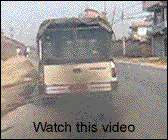
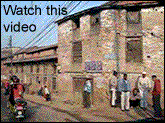
 It
appears we are back to the season of skylessness. I forgot about the
lack of a blue sky -- or any sky -- for a while, perhaps because there
were skies in Delhi for a bit. But now, some combination of heat and
pollution has made the sky recede again. It's strange to look out
from the seventh floor across to Delhi and just see this haze where
there should be a city. In winter, when it was a little clearer, the
scene above, the fields that separate my side of the river from Delhi
proper are pastoral and romantic. But now it looks as if the city
is dissolving, not in a way that's dreamy and mysterious, but in a
chemical and toxic fashion. I suppose it'll be a long while till I
see a sky such as the one I saw in March -- the one month of spring
-- setting off the monuments in Lodi Gardens.
It
appears we are back to the season of skylessness. I forgot about the
lack of a blue sky -- or any sky -- for a while, perhaps because there
were skies in Delhi for a bit. But now, some combination of heat and
pollution has made the sky recede again. It's strange to look out
from the seventh floor across to Delhi and just see this haze where
there should be a city. In winter, when it was a little clearer, the
scene above, the fields that separate my side of the river from Delhi
proper are pastoral and romantic. But now it looks as if the city
is dissolving, not in a way that's dreamy and mysterious, but in a
chemical and toxic fashion. I suppose it'll be a long while till I
see a sky such as the one I saw in March -- the one month of spring
-- setting off the monuments in Lodi Gardens.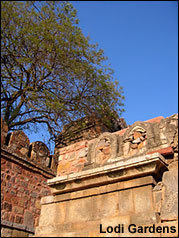 This
is also the time of contradictions and extremes. Like being extremely
clean (because you have to bathe five times a day to feel human) and
very dirty, since the moment you step out of the shower you are disheveled
and sweaty again. If the light goes, you find yourself sleeping in
a damp patch of your own perspiration ... and find it refreshing because
it's as close to cooling of any kind you'll get. The hotter it gets
the hotter the showers you take, since the water tanks are all located
on the rooves and water gets pretty warm when the weather is 45 degrees
celsius (120 Fahrenheit). I suppose this is only to be expected when
summer is preceded by a season that was, charmingly, both spring and
fall at the same time -- "pattjhar" it's called. All the leaves fell
off the trees and then the flowers bloomed.
This
is also the time of contradictions and extremes. Like being extremely
clean (because you have to bathe five times a day to feel human) and
very dirty, since the moment you step out of the shower you are disheveled
and sweaty again. If the light goes, you find yourself sleeping in
a damp patch of your own perspiration ... and find it refreshing because
it's as close to cooling of any kind you'll get. The hotter it gets
the hotter the showers you take, since the water tanks are all located
on the rooves and water gets pretty warm when the weather is 45 degrees
celsius (120 Fahrenheit). I suppose this is only to be expected when
summer is preceded by a season that was, charmingly, both spring and
fall at the same time -- "pattjhar" it's called. All the leaves fell
off the trees and then the flowers bloomed.